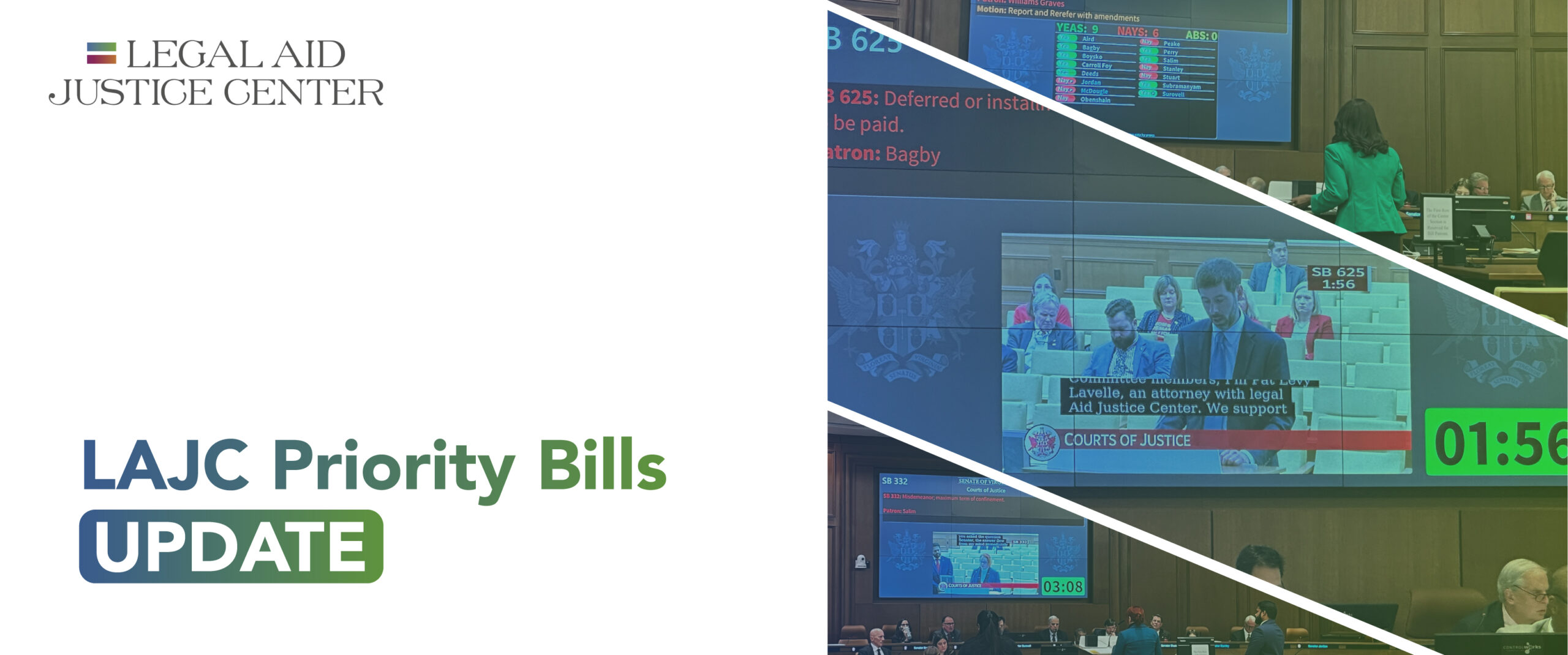
We have reached the halfway point for the 2024 General Assembly Session. For the past month, LAJC and our community partners have been actively doing offense and defense work, and here are some of the highlights:
- HB 824, Cousinsto address court appointment attorney debt In Virginia, passed in the House with an amendment to not allow any increase for court-appointed attorneys to be charged to the individual who is indigent. This bill is now heading to the Senate for consideration.
- HB 614, Priceto allow work while incarcerated to offset court debt, passed in the House and is now heading to the Senate for consideration. Unclear parameters in the law and varied local practices have been leading to denied eligible requests to use work while incarcerated to offset court debt, increasing overwhelming amounts of debt when an individual leaves a carceral setting. This legislation will require courts to accept these requests if the requestor meets the requirements of the law.
- SB 514, Williams Graves/HB 612, Priceto delay court debt sent to collections, both passed and are headed to the other body for consideration. The current Virginia Code allows for an individual to be sent to collections 90-days after a judgment is issued if an individual has not set up a payment plan or paid their bill in full. The proposed legislation would increase this to 180-days, which would combat this unnecessary cost for both individuals and Virginia.
- HB 246, Jones creates greater transparency for court fines and fees, passed the House, and is heading to the Senate for consideration. This legislation requires clerks to issue an itemized list of charges for court debt, which would be given upon assessment of court cost (including fines, fees, restitution, and any other costs) and available whenever a payment is made or upon request to increase the transparency of fines, fees, and interest accrual.
- SB 643, Aird and Deeds/HB 1114, Simoncreated the court appearance fairness. SB 643 did not make it off the Senate Floor, but HB 1114 passed the House and is headed to the Senate for consideration. Criminalizing court non-appearances is counter-productive, fostering coercive local plea-bargaining and contributing to over-criminalization. This legislation eliminates separate failure-to-appear criminal offenses, instead allowing courts to use other tools to address willful flight while ensuring that certain circumstances, such as incarceration or law enforcement custody, are not deemed willful non-appearance.
- SB 625, Bagby/HB 896, Hernandez to prevent the court from collecting a person’s SSA/SSI to pay court debt if that is their sole source of income. Both bills passed and are headed to the other body for consideration. Currently, the Federal Code states that courts are unable to collect court costs from individuals whose sole income is Social Security. However, this does not always occur in Virginia. This legislation codifies this to ensure consistent standards of practice.
- SB 695, Peake /HB 1496, Rasoulcreates a registry for surveillance technology. Both bills passed and are headed to the other body for consideration. These bills require local law enforcement to publicly register all surveillance technology deployed against their citizenry and require that technology be studied by the Joint Commission on Technology and Science in coordination with the Crime Commission to provide an opportunity for public input and the implications of using this technology, including misuse.
- SB 366, Boysko /HB 721, Clark sought to establishrent anti-gouging for localities. This legislation enables localities to implement rent stabilization to decrease the burden of ever-increasing housing costs and lower eviction rates across the Commonwealth. Unfortunately, neither of these bills passed the House or Senate. Many community members and advocates came out to support these bills and share their personal stories.
- HB 1494, Cousinsrequires the Department of Juvenile Justice to form a stakeholder workgroup to study the new length of stay guidelines. Unfortunately, this bill did not pass the House, but there is still currently language in the budget that if passed could establish the workgroup. This work group is aimed to study the ability of Bon Air Juvenile Correctional Center to maintain operational standards related to the community treatment model and all therapeutic, vocational, and educational programming since the introduction of significantly longer Length of Stay Guidelines adopted in March 2023.
- HB157, McClureeliminates the farmworker exemption to minimum wage raises. This bill passed the House and is headed to the Senate for consideration. A vestige of Jim Crow-era state laws, Virginia continues to exempt farmworkers and workers on H-2 migrant worker visas from the protections of the Virginia Minimum Wage Act (VMWA). This bill removes these exemptions from the VMWA.
- SB 332, Salim/ HB 956 reduces the maximum jail sentence for Class 1 misdemeanors by one day from 365 to 364 days. The Senate bill passed and is headed to the house for consideration. Unfortunately, the house bill did not pass. The bills address the mismatch between Virginia law and federal immigration law to provide federal immigration more discretion on immigration consequences.
In addition to these priority bills, LAJC has been working to oppose bills that could cause harm to the community including:
- Bills in the House and Senate to try to bring back presumptions against bail;
- Bills in the House and Senate to loosen confidential standards for juvenile records that would have allowed law enforcement to use those confidential records for other criminal investigations;
- Bills in the House and Senate allowing automatic license plate readers to be expanded to state highways and not requiring a warrant for police to access the data;
- Bills to lessen the qualifications and expand police in schools.
